Profile: Bill Clinton
- Published
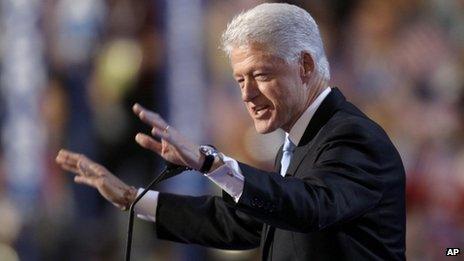
Bill Clinton: Great political skill and occasional personal weakness
Bill Clinton was the 42nd president of the United States. During eight years at the White House, his reputation as a peacemaker who brought economic prosperity to America was tarnished by his personal conduct.
He was born William Jefferson Blythe in Hope, Arkansas, on 19 August 1946. His father had died in a car accident three months earlier.
When he was four, his mother married a used car dealer called Roger Clinton. His stepfather was an alcoholic who beat his wife. At the age of 14, the young Bill Clinton warned him to stop.
In the early 1960s, he met his political hero, former President John F Kennedy, in the White House Rose Garden. Parallels between the two men would be drawn many times during the following years.
After studying at Georgetown University, Bill Clinton spent two years at Oxford University. It was here that he admitted smoking - but not inhaling - marijuana.
A supporter of civil rights and a campaigner against the Vietnam war, he took steps to ensure that he would not have to serve in it.
Later, his critics would use the episode to question Mr Clinton's patriotism and character.
After graduating in law from Yale in 1973, he returned to Arkansas to teach law and enter politics.
White House
Defeated for Congress in 1974, a year later he married Hillary Rodham, an ambitious young lawyer whom he had met while at Yale. Their daughter Chelsea was born in 1980.
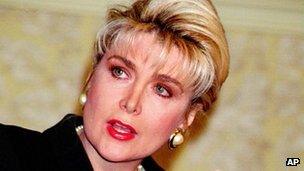
Gennifer Flowers claimed she had an affair with Bill Clinton
Elected Arkansas' attorney general in 1976, Mr Clinton won the governorship of the state two years later. The astute scholar had become a political high-flyer at the tender age of 32.
Losing the governorship in 1982, he regained it in 1986 and held it until his election to the White House in 1992.
Mr Clinton's campaign against the incumbent President George H W Bush was almost derailed before it started. A nightclub singer named Gennifer Flowers alleged he was her former lover.
With the evasive manner which was to become a hallmark of his presidency, the Clintons went on national television and professed their love for one another while not directly denying Gennifer Flowers' claims.
A popular mood for change swept Mr Clinton and his running mate, Al Gore, into the White House.
Whitewater
He committed the government to reduce the deficit and reform the US healthcare system. The latter was entrusted to the First Lady, but her recommendations were so unwieldy and unpopular that they had to be scrapped.
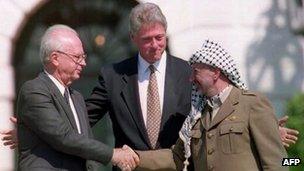
A historic handshake: Rabin, Bill Clinton and Arafat in September 1993
The Clinton presidency was stumbling, amidst the stirrings of a scandal. Whitewater, an Arkansas property company partly owned by the Clintons, was investigated for financial malpractice while the Clintons were in the Arkansas governor's mansion.
There was also the apparent suicide of a deputy White House counsel and close friend of the Clintons from Arkansas, Vince Foster. In July 1993, Foster was found dead in his car in a Washington park. A gun was at his side.
The Clintons mourned their friend, but suspicion about the manner of his death and the Whitewater affair would never be far from the presidency.
In September 1993, in a remarkable ceremony on the White House lawn, Israel's Prime Minister, Yitzhak Rabin, and the Palestine Liberation Organisation's Yasser Arafat, shook hands after signing a peace deal.
Peace in Northern Ireland
Mr Clinton, who had nurtured and engineered the treaty, basked in the glow of a diplomatic coup. Rabin's death, two years later, was a shocking blow.
At home, he presided over an economic boom, with cuts in the deficit accompanied by reductions in unemployment.
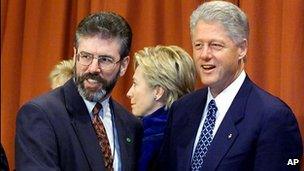
Bill Clinton worked hard for peace in Northern Ireland
In November 1995, Mr Clinton became the first US president to visit Northern Ireland. Throughout his tenure, he committed himself to bringing peace to the province.
He sponsored the process which culminated in the 1998 Good Friday Agreement, brokered by his nominee and political colleague, George Mitchell.
A crushing defeat of the Democrats at the 1994 congressional elections, for which he took the blame, was not enough to prevent Mr Clinton from being elected again in 1996. He was, simply, the slickest political operator in town.
Impeachment
But Mr Clinton's second term was tarnished by scandal. Another woman, Paula Jones, pursued a claim for sexual harassment against the president. During the case, a former White House intern was called to give evidence.
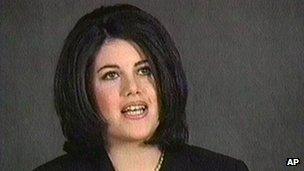
Monica Lewinsky during her deposition at the Senate's Clinton impeachment trial
Her name: Monica Lewinsky.
Both she and the president testified that they had not had a sexual relationship. Further examination revealed that they had both lied under oath. The way was clear for Mr Clinton's opponents in Congress to impeach him.
Though they were unsuccessful, the sight of the president having his private life raked over for weeks in the full glare of the Congressional spotlight was demeaning to both the man and the office he held.
Towering political presence
His final two years in office saw Mr Clinton struggling with his reputation as a womaniser. His wife, Hillary, now entered public life in her own right, winning a US Senate seat in New York state in November 2000.
His Vice-President, Al Gore, controversially lost the closest presidential election in living memory at the same time.
But Mr Clinton's popularity was still such that, barring the legal impossibility of standing for president for a third time in 2000, he would probably have beaten off the challenge of George W Bush.
Since leaving office, Mr Clinton has travelled the world, effortlessly charming crowds wherever he goes. He stopped traffic in London's Piccadilly and drew vast numbers of admirers in Belfast.
He also set up the William J Clinton Foundation to promote and address international humanitarian causes such as treatment and prevention of HIV/Aids and global warming.
In 2005 he founded the Clinton Global Initiative, engaging world leaders in development initiatives of global concern.
In 2004, his much-vaunted memoirs were published. The huge volume, more than 950 pages long, was panned by many critics as being overwritten yet lacking depth.
Even so, the revelations about the Lewinsky affair, after which he said he was "in the doghouse", and when his wife considered leaving him, made My Life, as the book was called, a worldwide best-seller.
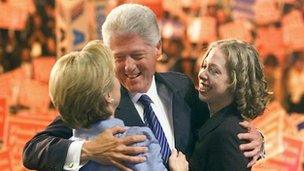
In the bosom of his family
Known for his love of fast-food during his time in the White House, Mr Clinton underwent quadruple-bypass surgery in September 2004 after experiencing chest pains.
And in February 2010, he underwent a minor heart procedure in New York, after complaining of discomfort in his chest.
But he has not let any worries about his health slacken his work rate.
In August 2009, Mr Clinton made a dramatic flight to North Korea, in a bid to release two US journalists who had been arrested the previous March after allegedly entering the secretive country illegally.
After his talks with North Korea's reclusive leader, Kim Jong-il, it was announced that the reporters had been pardoned and they were allowed to fly back to the US with the former President.
At the same time, Mr Clinton took up the role of UN special envoy to Haiti.
Since an earthquake devastated the Caribbean nation in January 2010, he has worked tirelessly to help the relief effort.
Mr Clinton was asked to speak at the 2012 Democratic National Convention in Charlotte, North Carolina, and formally re-nominate Barack Obama as the party's presidential candidate in the November election.